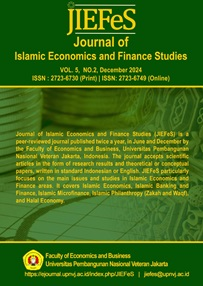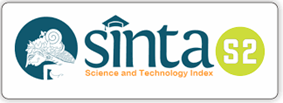Role of Institutional Zakat Management of Bangladesh in Recipients’ Income Generation
DOI:
https://doi.org/10.47700/jiefes.v5i2.8193Keywords:
Income Generation, Income Growth, Zakat, Zakat Institutions, Zakat ManagementAbstract
The majority of Muslims in Bangladesh distribute zakat individually. Zakat management is conducted in both the public and private sectors. However, there is a significant lack of inclination towards making zakat payments via organizations. This research aims to investigate the role of zakat in generating money via institutional management. This study used a mixed-method approach, including qualitative and quantitative data. A systematic questionnaire survey was conducted on 200 people who received zakat, representing both the institutional and non-institutional sectors. The findings of this research suggest that those who received zakat via institutions had a greater capacity to generate money than those who got zakat through informal means. Several zakat management institutions are helping zakat recipients increase their income by supplying them with income-generating items and a significant quantity of zakat funds. It may be inferred that the proper implementation of institutional zakat management has the potential to enhance the income growth rate of zakat recipients in Bangladesh.
References
Afandi, M. F. M., Zubairi, M. I. N., Hashim, M. J., & Khamis, M. R. (2021). The Role of Zakat in Reducing Income Inequality Among Muslim Society in Selangor. Global Business and Management Research: An International Journal, 13(4), 1–12. http://www.gbmrjournal.com/pdf/v13n4/V13N4-1.pdf
Afif, M., Hidayat, A. A., Suminto, A., Abidin, T. A., & Farabi, F. A. A. (2023). Analysis of Zakat Management with Institutional Isomorphic Theorizing Approach. Journal of Islamic Economics and Finance Studies, 4(2), 214–235. https://doi.org/10.47700/jiefes.v4i2.6333
Al-Bukhari, A. A. M. bin I. (1993). Sahih Al-Bukhari (5th ed., Vol. 1). Daru Ibn Kathir, Dar Al-Yamamah.
Al-Haddad, U., Maulana, A., Majid, R., & Rahman, M. F. (2024). Zakat and Socio-Economic Impact: The Role of Local Government and Zakat Institutions. Institutions and Economies, 16(3), 27–50. https://doi.org/10.22452/IJIE.vol16no3.2
Alim, M. N. (2015). Utilization and Accounting of Zakat for Productive Purposes in Indonesia: A Review. 211, 232–236. https://doi.org/10.1016/j.sbspro.2015.11.028
Al-Nawawi, A. jakaria M. (1929). Al-Majmu’ Sharh Al-Muhazzab. Idarah Al-Taba’ah Al-Muniriyyah.
As-Sunnah Foundation. (2023). Special report.
Aziz, A. H., & Moniruzzaman, M. (2023). Challenges in Achieving SDG 2 - Zero Hunger in Bangladesh: An Analytical Study on Food Certainty in Bangladesh from Zakat Perspective. International Journal of Zakat, 8(1), 43–63. https://doi.org/10.37706/ijaz.v8i1.398
CZM Brochure. (2020). Center for Zakat Management-CZM. https://czm-bd.org/wp-content/uploads/CZM-Brochure-2020_compressed.pdf
Debnath, S. C. (2015). The potential of zakat scheme as an alternative of microcredit to alleviate poverty in Bangladesh. Ritsumeikan Annual Review of International Studies, 14, 1–12.
Durohman, H., Sutisna, F. A., & Anugrah, M. Y. (2023). Socio-Economic Determinants of Individual Muslim Zakat Payment Behavior in Indonesia. Journal of Islamic Economics and Finance Studies, 4(2), 257–277. https://doi.org/10.47700/jiefes.v4i2.6715
Hassan, M. K., Khan, M. Z. H., Miah, M. A., & Islam, Md. K. (2024). The national-level potential of Zakat and its integration into the fiscal framework: Sector-specific insights from the economy of Bangladesh. International Journal of Islamic and Middle Eastern Finance and Management, 17(1), 146–169. https://doi.org/10.1108/IMEFM-09-2023-0313
Jedidia, K. B., & Guerbouj, K. (2020). Effects of zakat on the economic growth in selected Islamic countries: Empirical evidence. International Journal of Development Issues, 20(1), 126–142.
Jiffry, M. A. C. M., Zaroum, A. M. A., Amanullah, M., & Rahmani, A. (2023). Why do Zakah Institutions in Sri Lanka Underperform? Journal of Islamic Economics and Finance Studies, 4(2), 145–164. https://doi.org/10.47700/jiefes.v4i2.6157
Judijanto, L., Budi, H., Irwan, M., Kurniawan, R., & Awwalunnisa, N. (2024). Analysis of the Effectiveness of Zakat Collection, Management, and Distribution in Improving Social Welfare in Indonesia. West Science Islamic Studies, 2(01), 15–23. https://doi.org/10.58812/wsiss.v2i01.586
Khaliq, A., Lutfi, M., Muin, R., & Jaya, A. (2023). Use Of Zakat Funds For Productive Purposes In Indonesia. Jurnal Ekonomi Islam, 6(1), 39–44.
Khamis, M. R., Hashim, M. jameelah, & Rahman, A. A. (2024). Effectiveness Role of Zakat in Reducing Income Inequality Among Muslim Society. Ulum Islamiyyah, 36(03), 26–37. https://doi.org/10.33102/uij.vol36no03.604
Khasandy, E. A., & Badrudin, R. (2019). The Influence of Zakat on Economic Growth and Welfare Society in Indonesia. Integrated Journal of Business and Economics, 3(1), 65–79. https://doi.org/10.33019/ijbe.v3i1.89
Lubis, M. (2019). Zakat Management System: Designing Effective Approach Through Knowledge Management System. International Journal of Web Applications, 11(1), 1–16. https://www.dline.info/ijwa/fulltext/v11n1/ijwav11n1_1.pdf
Mahmood, T. M. A. T., Din, N. M., Mamun, A. A., & Ibrahim, M. D. (2021). Issues And Challenges Of Zakat Institutions Achieving Maqasid Syariah In Malaysia. AZKA International Journal of Zakat & Social Finance, 2(1), 119–137. https://doi.org/10.51377/azjaf.vol2no1.46
Miah, A. (2021). Effectiveness of Zakat-based Poverty Alleviation Program. International Journal of Zakat, 6(2), Article 2. https://doi.org/10.37706/ijaz.v6i2.325
Miah, M. A. (2024). CEO’s Report on 15 Years Journey of CZM. In 15 Years Journey 2008—2023. Center for Zakat Management-CZM. https://czm-bd.org/wp-content/uploads/15-Years-Journey-of-CZM_Final.pdf
Muhammad, A. D. (2024). Trends and Developments in Contemporary Zakat Administration. Journal of Islamic Economics and Finance Studies, 5(1), 67–81. https://doi.org/10.47700/jiefes.v5i1.7952
Nabi, G., Islam, D. A., Sarder, W., & Rahman, M. (2021). Estimation of Zakat and Its Use as An Effective Tool for Socio-economic Development in Bangladesh. Thoughts on Economics, 31(1 and 2), 31–56.
Nor, A. I. (2024). Entrepreneurship Development as a Tool for Employment Creation, Income Generation, and Poverty Reduction for the Youth and Women. Journal of the Knowledge Economy. https://doi.org/10.1007/s13132-024-01747-w
Rafiq, R. I. (2016). General Mosque Based Zakat Model To The Alleviation Of Poverty- Evidence From Bangladesh. IOSR Journal of Business and Management, 18(4), 1–9. https://doi.org/10.9790/487X-1804040109
Rahman, H. Z. (2018). Poverty Graduation Through Zakat-Based Programs: Post-Project Assessment of the JEEBIKA Karnaphuli Mohora project. Center for Zakat Management CZM. https://czm-bd.org/wp-content/uploads/2019/12/Poverty-Graduation-through-Zakat-based-Programs-Dr.-Hossain-Zillur-Rahman.pdf
Rahman, M. M. (2024). Institutional Zakat Management in Bangladesh: Collection and Distribution Practices. AZKA International Journal of Zakat & Social Finance, 5(2), 129–154. https://doi.org/10.51377/azjaf.vol5no2.192
Riyadi, A. H., Abdukad, A. A. S., Saif, B. M., Takow, H. A., & Sharofiddin, A. (2021). The Effect of Utilizing Zakat Fund on Financing Production to Achieving Social Welfare: In Indonesia as a Case Study. Journal of Islamic Finance, 10(1), 019–029. https://doi.org/10.31436/jif.v10i.524
Safitri, H. F., Zahroh, F., & Suprayitno, E. (2024). The Influence of Distribution of Zakat, Infaq and Sadaqah (ZIS) Funds and Economic Generation on the Social Welfare of the City/Regency Level in East Java in 2021-2023. International Journal of Management Research and Economics, 2(3), 286–304. https://doi.org/10.54066/ijmre-itb.v2i3.2060
Salithamby, A. R., Hatta, Z. A., & Fahrudin, A. (2022). Institutionalized zakāh in addressing well-being problems in non- Muslim Majority Sri Lanka. Journal of King Abdulaziz University: Islamic Economics, 35(2), 42–53. https://doi.org/10.4197/Islec.35-2.3
Sari, M. D., Bahari, Z., & Hamat, Z. (2013). Review on Indonesian zakah management and obstacles. Social Sciences, 2(2), 76–89. https://doi.org/10.11648/j.ss.20130202.18
Sarif, S., Ali, N. A., & Kamri, N. ‘Azzah. (2024). Zakat for generating sustainable income: An emerging mechanism of productive distribution. Cogent Business & Management, 11(1), 1–13. https://doi.org/10.1080/23311975.2024.2312598
Sarif, S., & Kamri, N. ’Azzah. (2009). A Theoretical Discussion of Zakat For Income Generation and Its Fiqh Issues. Jurnal Syariah, 17(3), 457–500. https://ejournal.um.edu.my/index.php/JS/article/view/22691
Sohag, K., Tanvir Mahmud, K., Ferdous, Md., & Samargandi, N. (2015). Can Zakat System Alleviate Rural Poverty in Bangladesh? A Propensity Score Matching Approach. Journal of Poverty, 19, 261–277. https://doi.org/10.1080/10875549.2014.999974
Suriani, Nurdin, R., & Muhammad. (2020). Causality Relationship of Zakat, Income Inequality, and Poverty: A Panel Co-Integration Approach. International Journal of Economics and Business Administration, VIII(Issue 4), 875–887. https://doi.org/10.35808/ijeba/637
The Zakat Fund Management Bill-2023. (2023, January 31). Bangladesh Gazette. http://bdlaws.minlaw.gov.bd/upload/act/2023-02-14-14-36-05-Act--No-5-of-2023.pdf.
Wutsqah, U. (2021). Productive Zakat for Community Empowerment: An Indonesian Context. JOURNAL OF SHARIA ECONOMICS, 3(1), 1–17. https://doi.org/10.35896/jse.v3i1.179
Zakat Board. (2023). Special report. Islamic Foundation.
Downloads
Published
Issue
Section
License
Copyright (c) 2025 Md. Muhibur Rahman

This work is licensed under a Creative Commons Attribution 4.0 International License.
Authors who publish with this journal agree to the following terms:
- Authors retain copyright and grant the journal right of first publication with the work simultaneously licensed under a Creative Commons Attribution 4.0 International License that allows others to share the work with an acknowledgment of the work's authorship and initial publication in this journal.
- Authors can enter into separate, additional contractual arrangements for the non-exclusive distribution of the journal's published version of the work (e.g., post it to an institutional repository or publish it in a book), with an acknowledgment of its initial publication in this journal.
- Authors are permitted and encouraged to post their work online (e.g., in institutional repositories or on their website) before and during the submission process, as it can lead to productive exchanges, as well as earlier and greater citation of published work.

This work is licensed under a Creative Commons Attribution 4.0 International License.











